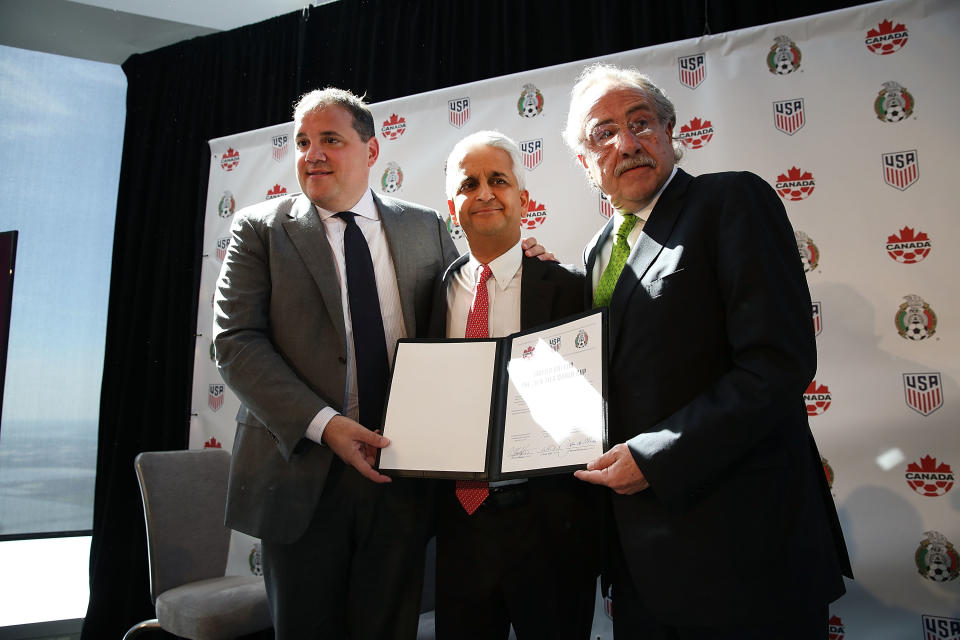The US-Mexico-Canada joint bid will have one competitor for the 2026 World Cup

On the deadline for nations to express interest in hosting the 2026 World Cup, the Moroccan Football Federation threw its name into FIFA’s hat, giving a heavily-favored joint bid from the United States, Canada and Mexico one competitor.
The Moroccan federation announced its bid with a short statement Friday, saying that it had sent the necessary paperwork to FIFA.
Morocco’s bid has been backed by CAF, the African confederation, which is one of four confederations eligible to bid for the 2026 World Cup. With Russia hosting the 2018 event and Qatar scheduled to host the 2022 edition, both Europe and Asia, by FIFA rule, are ineligible.
Their ineligibility cleared the way for the North American bid, officially announced back in April, to seemingly step to the front of the line to stage the 2026 edition.
In May, FIFA voted to fast-track the bidding process, which was initially scheduled to run until 2020. The strength of the U.S.-Canada-Mexico bid prompted FIFA to revamp its timeline. That new timeline set Friday as the deadline for prospective bidders to express interest. Bidders must then present their proposals to FIFA by March 16, 2018. Finally, on the eve of next summer’s World Cup, a vote will be held to potentially select one of the bids.
Here’s more on the timeline, from FIFA:
“Based on specific regulations to be issued by the Council, the FIFA administration shall establish a bidding procedure inviting initially only the member associations of CAF, CONCACAF, CONMEBOL and the OFC as candidates to submit to FIFA bids to host the final competition of the 2026 FIFA World Cup by 11 August 2017. The 68th FIFA Congress will decide on the selection of the candidate host associations.
“Should the 68th FIFA Congress decide not to select the candidate host associations, the FIFA administration will invite further member associations (including those in the AFC and UEFA, but excluding those associations that have already submitted a bid) to submit a bid to host the final competition of the 2026 FIFA World Cup. In such case, the final decision would be made at the FIFA Congress in 2020.”
The key point is that second paragraph. It is not an either-or decision between the North American bid and the Moroccan bid. Should FIFA’s voters deem both flawed or unworthy, it could vote for neither. That would put the bidding process back on its original timeline. It would also open it up to European and Asian countries, and would close the door on the North American bid. That scenario, though, seems unlikely.
One factor working in favor of the North American bid will be the size of the 2026 World Cup — 48 teams and 80 games, expanded from the previous format of 32 and 64. The infrastructure already in place in the U.S., Canada and Mexico would be far better equipped to handle such a vast enterprise. Under the announced proposal, the U.S. would host 60 of the 80 games, while Canada and Mexico would get 10 each.
“We’ve always been prepared for the fact that other countries could also decide to bid for the 2026 FIFA World Cup,” U.S. Soccer president Sunil Gulati said in a statement. “Competition is good, and overall it shows the value and importance of the World Cup.
“Over the next eight months we’ve got a lot of work to do. The United Bid Committee has already started that work, and we will now go into full motion with our team in New York, in collaboration with our partners in Canada and Mexico.”
Gulati said that the North American bid committee will announce a list of cities that “are interested in being part of the World Cup in 2026 across all three countries” next week.
It’s never wise to rule out underhanded FIFA skullduggery, and thus it’s never safe to assume the U.S., Canada and Mexico have all but locked up the 2026 World Cup. But any other outcome would be surprising to say the least.


